Items
Mediator is exactly
Working Students
-
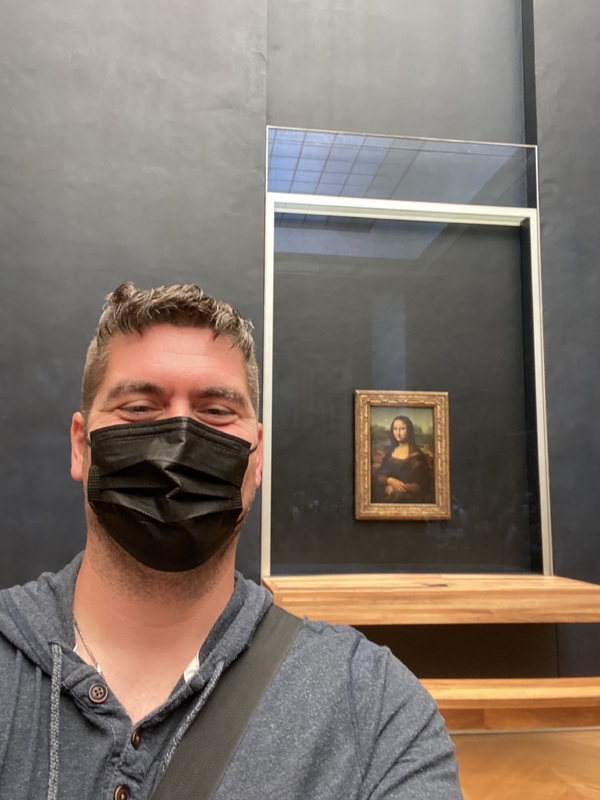 2022-06-03
2022-06-03First Student Trip After COVID-19 Pandemic Began
I have led a student global travel trip for the last 10 years at my school. Because of the COVID-19 outbreak in 2020, our trip to Australia and New Zealand was delayed/cancelled until 2021 in hopes of COVID being over by then. I had 27 students have to postpone traveling on this trip. In 2021, we came across the same restrictions, and our trip was cancelled again. As we we were planning our 2022 trip, New Zealand still had quarantine rules that would have kept us in the hotel for a week before we would get to go anywhere or do anything. Due to this, we changed our trip to one to France, Switzerland, Germany, and Austria. My students wanted to travel again, but did not know what to expect. There were still masking rules in place in a lot of the places we visited, and everyone had to take a mandatory COVID-19 test to be able to leave Europe at the end of the trip and get back into the United States. This was the scariest part because if your test revealed you were positive for COVID, you were required to stay in the country until you were negative. Everyone on the trip dreaded the day of the test because we had heard so many stories about other schools on different trips that had students who had failed the test. The trip was extremely important to me because it represented these students being able to fully restart their lives and finally be able to be kids again. This is a picture of me from the Louvre waiting my turn to see the Mona Lisa. It was taken immediately after I took a picture of all my students in front of the painting. I can see the happiness in my eyes again, getting to see students do something they love to do. -
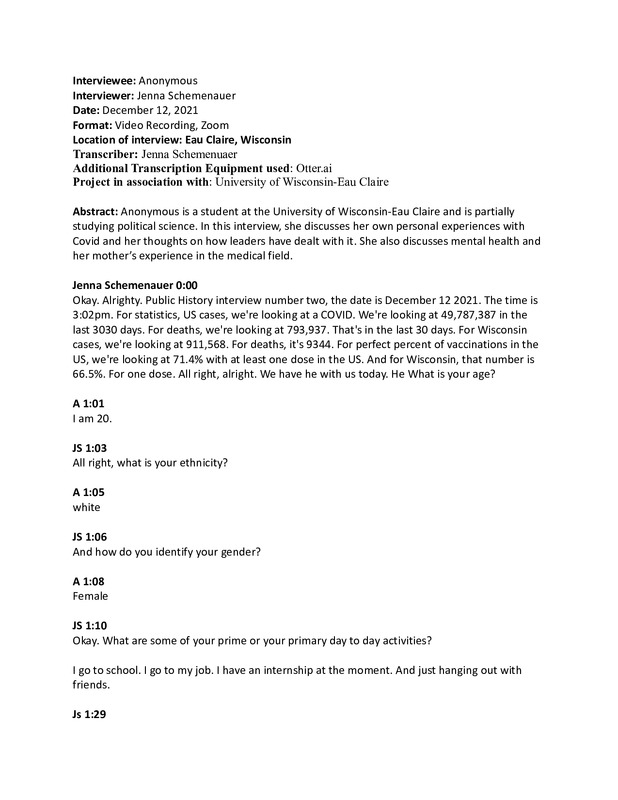 12/12/2021
12/12/2021Anonymous Oral History, 2021/12/12
Anonymous is a student at the University of Wisconsin-Eau Claire and is partially studying political science. In this interview, she discusses her own personal experiences with Covid and her thoughts on how leaders have dealt with it. She also discusses mental health and her mother’s experience in the medical field. -
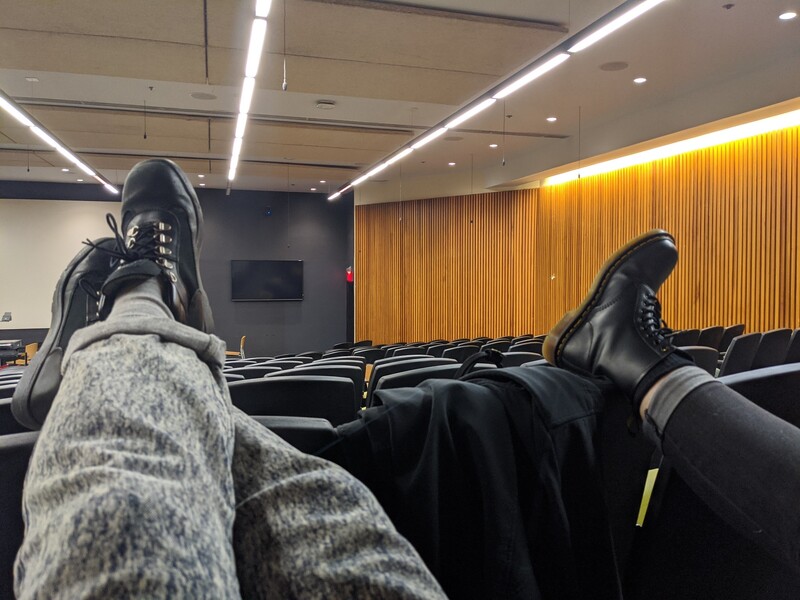 March 13, 2020
March 13, 2020unbeknownst emptiness
I worked/attended CUNY Hunter College during the start of the pandemic. On March 13, 2020, we were informed that we would not be returning to work until further notice, and I believe that a majority of late-night classes/activities were cancelled. As a result, my friend/coworker and I walked around the near-empty campus. We ended up sneaking into an empty lecture hall, ate some snacks, and chatted about the future. I took a photo of our feet up on the seats as a sort of fun memento, to show how crazy it looked to see ourselves amongst the empty hall, and when a coworker asked where we are, we sent them that. The photo meant almost nothing at the time and was just a casual photo I took amongst many in my every day. Looking back now, it holds nostalgia as well as dread. I think the emptiness shows what was to come, and how terrifying it would be, and just how impactful the pandemic was on our lives. I have not stepped foot in Hunter since then, so that was truly my last time being in that school. It makes me sad and makes me think what the future would have held had these events not happened. -
2022-06-01
Covid-19 Through the eyes of a young adult industry worker
I remember the days leading up to lock down, one of my professors was warning us that if need be we would effortlessly be able to transition the remaining weeks of class online. To my peers and I, we thought that was a little extreme to talk to us about going remote, we didn't think something that was happening in another continent would reach us so quickly. Fast forward a week or two, work was so slow we were ordering food and sitting around talking for the entirety of our shift. At the time I was a host and was getting paid hourly so I didn't mind but I didn't think about the way it was affecting our bartenders and servers. Within the next two days we were shutdown and I was filing for unemployment. Interestingly enough, that time was the most money I've ever made in my life. I was collecting 2-3x more money than I would have gotten if I was working. I changed my life style, I started nannying once August of 2022 came around because I couldn't afford to only have my hourly host pay once things started to open back up again. I was eventually given a promotion at work to Bartend once my nanny family no longer needed me since they were comfortable with the kids going back to school and day care. I was making a livable wage but it was nothing compared to what sales were before covid. It was never consistent, when the numbers began to spike people, reasonably so, would stay home and money was tight. I was so unhappy at my current job I was despiertly seeking a new one but in January of 2022, it was still a little scary, numbers were spiking and finding a new industry job seemed next to impossible. I found one but it came with a lot of consequences. I struggled financially for months. If it wasn't for the support of my family, I wasn't sure if I would have been able to make rent, pay my car, or even feed myself. Thankfully as the months have gone on it's gotten better. It's now June of 2022; over two years since the pandemic first started, and while nothing is normal, it's the closest it's ever been. Those who were once in the same position as me, scared of how they were going to survive are back to making livable wages. But I won't lie, I'm still scared, there is no certainty or promise that things will stay as "normal" as they are this 2022 summer. All we can do is hope and pray, and be thankful and grateful we're here to talk about it. -
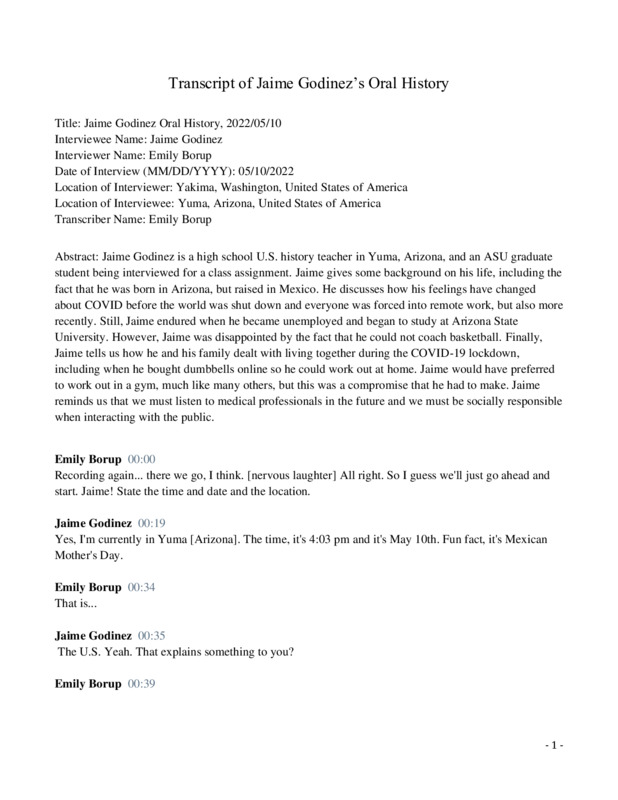 2022-05-10
2022-05-10Jaime J. Godinez Oral History, 2022/05/10
Jaime Godinez is a high school U.S. history teacher in Yuma, Arizona, and an ASU graduate student being interviewed for a class assignment. Jaime gives some background on his life, including the fact that he was born in Arizona, but raised in Mexico. He discusses how his feelings have changed about COVID before the world was shut down and everyone was forced into remote work, but also more recently. Still, Jaime endured when he became unemployed and began to study at Arizona State University. However, Jaime was disappointed by the fact that he could not coach basketball. Finally, Jaime tells us how he and his family dealt with living together during the COVID-19 lockdown, including when he bought dumbbells online so he could work out at home. Jaime would have preferred to work out in a gym, much like many others, but this was a compromise that he had to make. Jaime reminds us that we must listen to medical professionals in the future and we must be socially responsible when interacting with the public. -
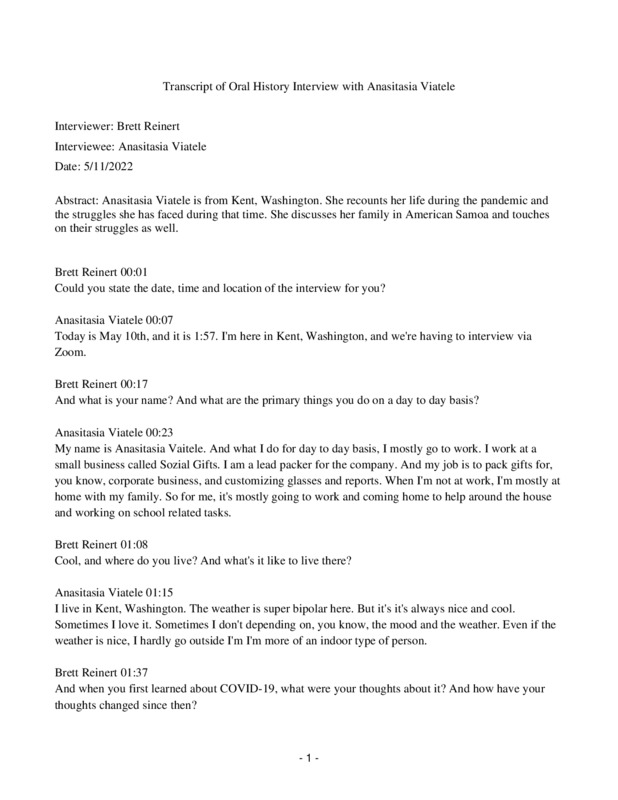 2022-05-10
2022-05-10Anasitasia Viatele Oral History, 2022/05/15
Anasitasia Viatele is from Kent, Washington. She recounts her life during the pandemic and the struggles she has faced during that time. She discusses her family in American Samoa and touches on their struggles as well. -
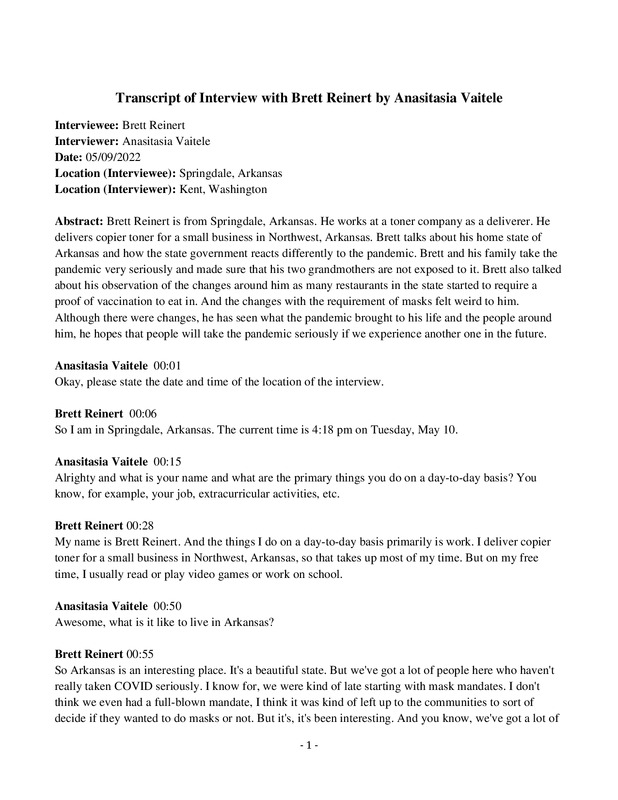 2022-05-09
2022-05-09Brett Reinert Oral History, 2022/05/09
Brett Reinert is from Springdale, Arkansas. He works at a toner company as a deliverer. He delivers copier toner for a small business in Northwest, Arkansas. Brett talks about his home state of Arkansas and how the state government reacts differently to the pandemic. Brett and his family take the pandemic very seriously and made sure that his two grandmothers are not exposed to it. Brett also talked about his observation of the changes around him as many restaurants in the state started to require a proof of vaccination to eat in. And the changes with the requirement of masks felt weird to him. Although there were changes, he has seen what the pandemic brought to his life and the people around him, he hopes that people will take the pandemic seriously if we experience another one in the future -
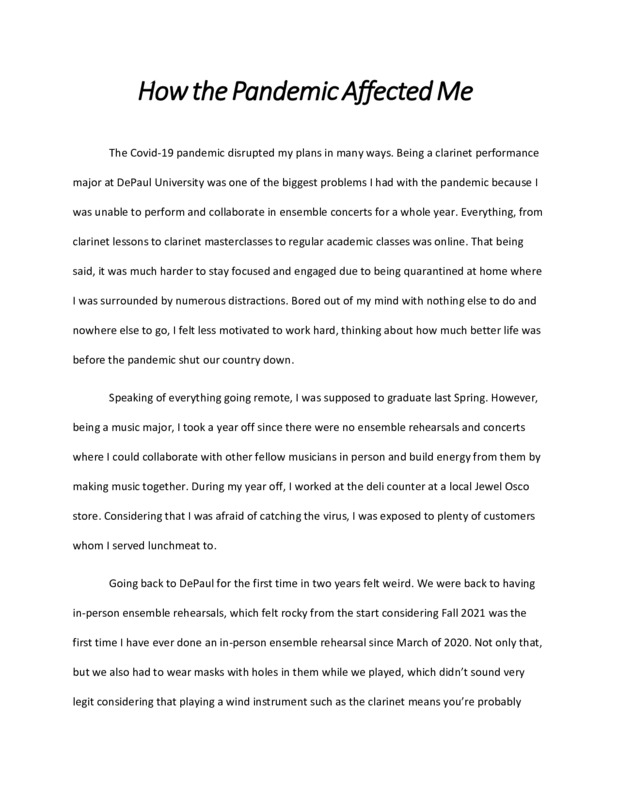 2022-05-13
2022-05-13How the Pandemic Affected Me
It's about the Pandemic disrupting my plans for graduating from college with a Bachelor's Degree in Music Performance. Being a clarinet player, I took a year off since the pandemic prevented us, musicians, from collaborating live with each other in person. -
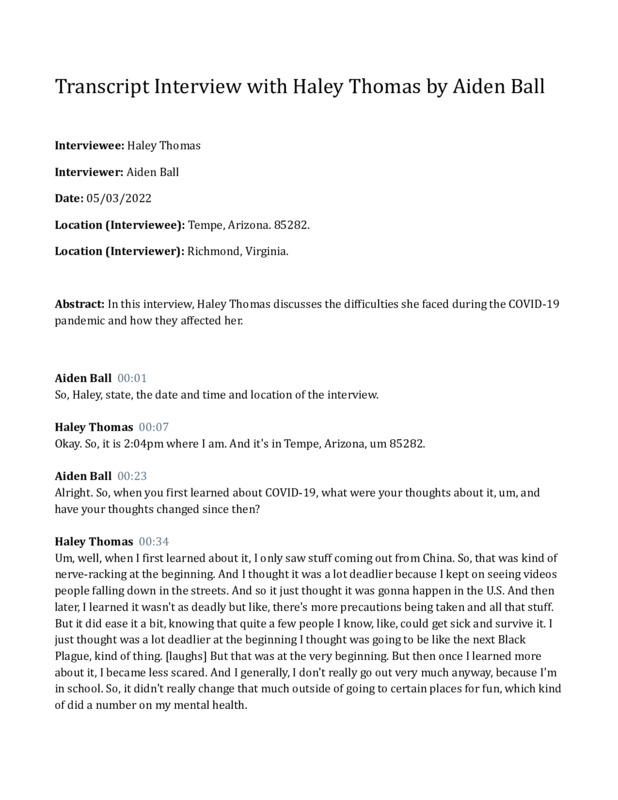 2022-05-03
2022-05-03Haley Thomas Oral History, 2022/05/03
In this interview, Haley Thomas discusses the difficulties she faced during the COVID-19 pandemic and how they affected her. -
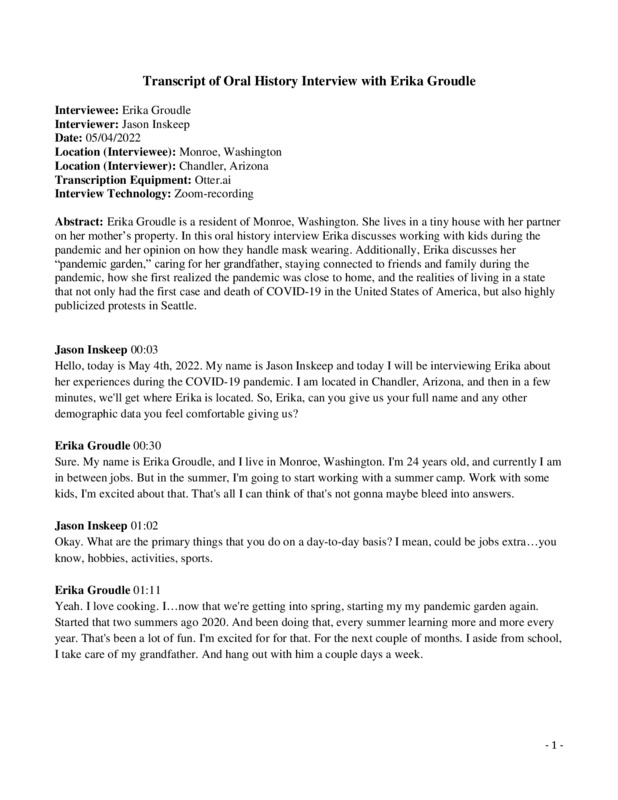 2022-05-04
2022-05-04Erika Groudle Oral History, 2022/05/04
Erika Groudle is a resident of Monroe, Washington. She lives in a tiny house with her partner on her mother’s property. In this oral history interview Erika discusses working with kids during the pandemic and her opinion on how they handle mask wearing. Additionally, Erika discusses her “pandemic garden,” caring for her grandfather, staying connected to friends and family during the pandemic, how she first realized the pandemic was close to home, and the realities of living in a state that not only had the first case and death of COVID-19 in the United States of America, but also highly publicized protests in Seattle. Interviewer: Jason Inskeep Interviewee: Erika Groudle -
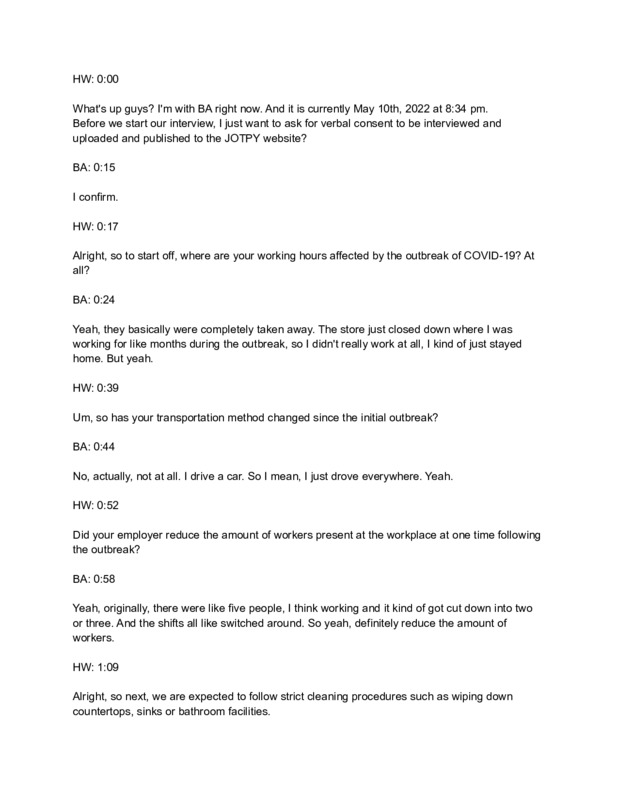 2022-05-10
2022-05-10BA Oral History, 2022/05/11
A student describes their experience working during the Covid-19 outbreak. -
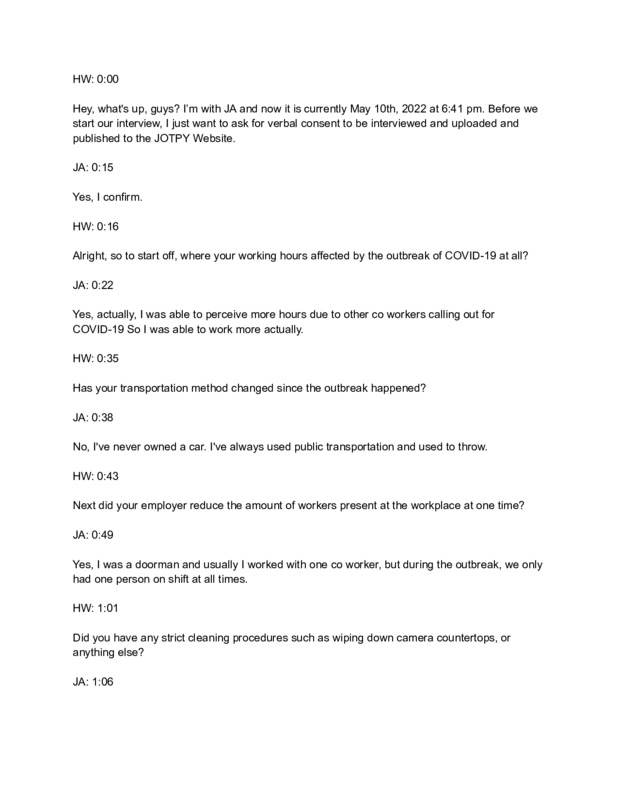 2022-05-10
2022-05-10JA Oral History, 2022/05/11
A student describes their experience working during the Covid-19 outbreak. -
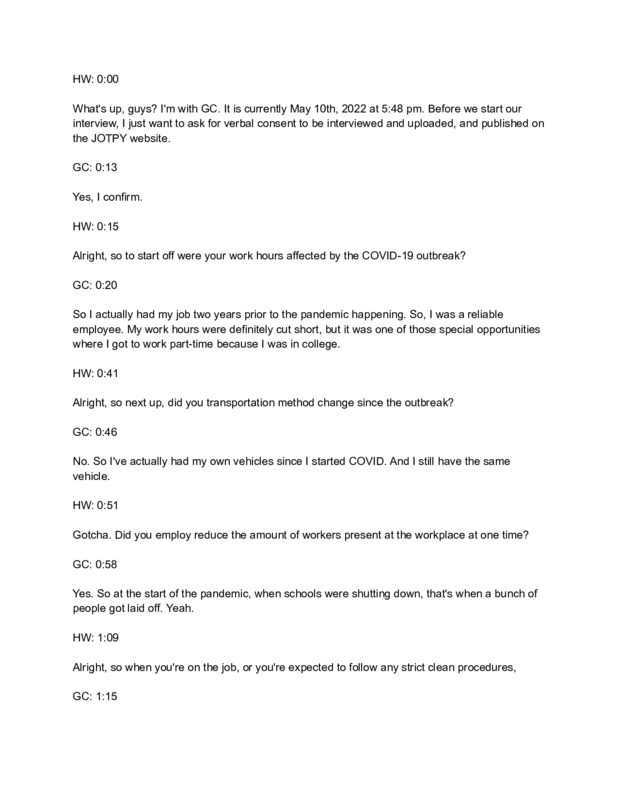 2022-05-10
2022-05-10GC Oral History, 2022/05/11
A student describes their experience working during the Covid-19 outbreak. -
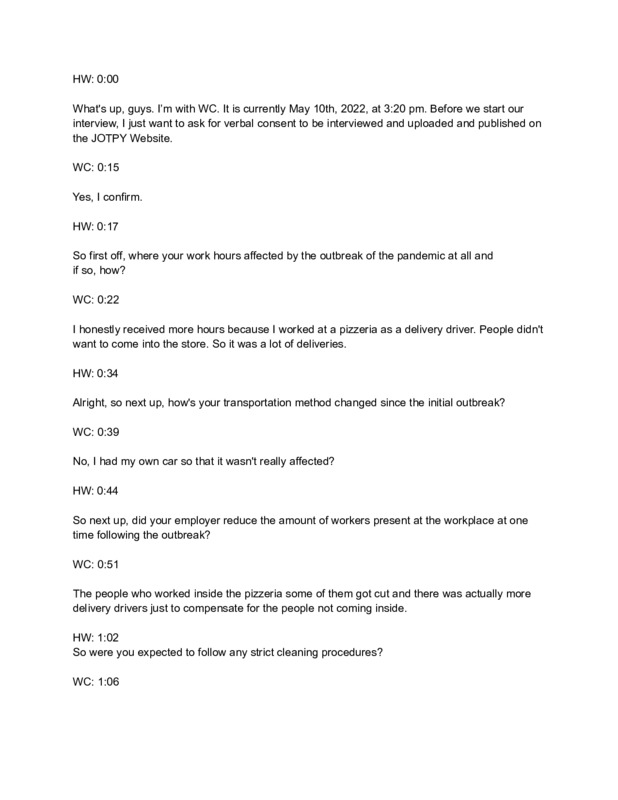 2022-05-10
2022-05-10WC Oral History, 2022/05/11
A student describes their experience working during the Covid-19 outbreak. -
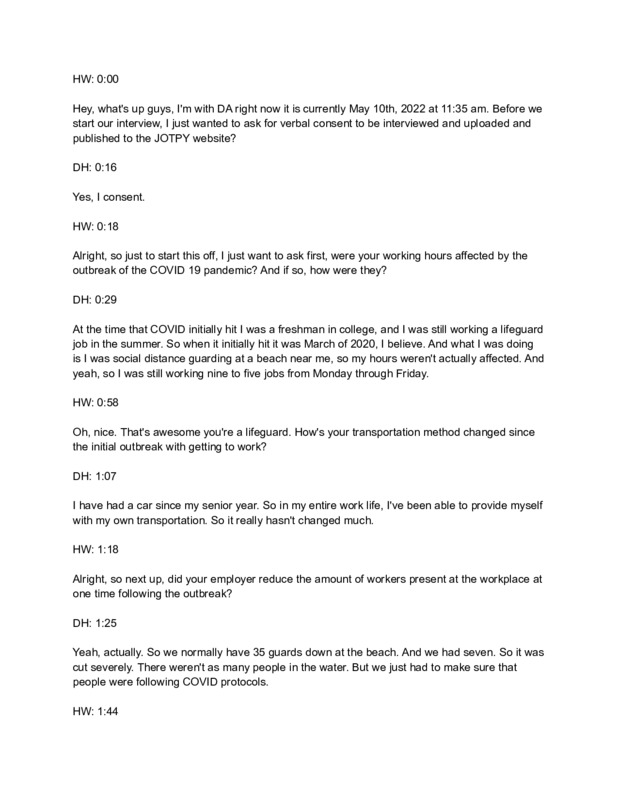 2022-05-10
2022-05-10DH Oral History, 2022/05/11
A student describes their experience working during the Covid-19 outbreak. -
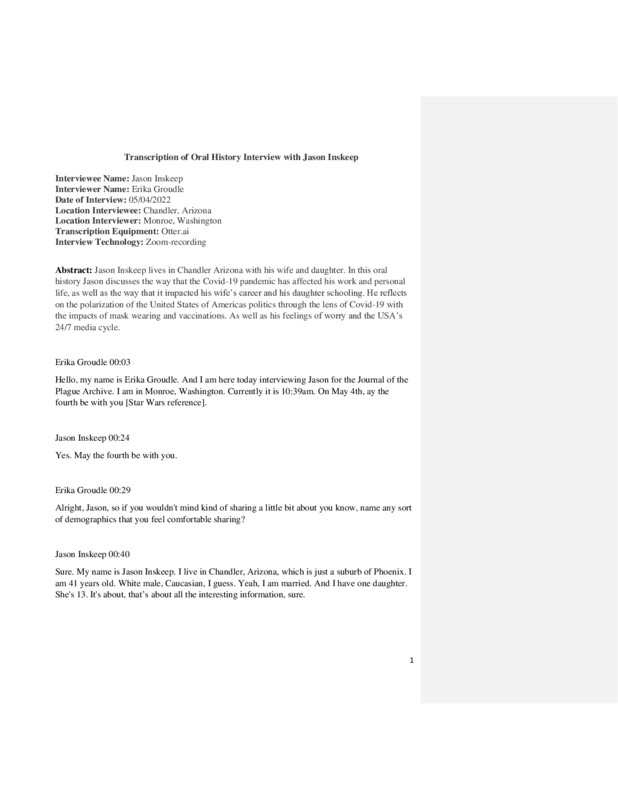 2022-05-04
2022-05-04Jason Inskeep Oral History, 2022/05/04
Jason Inskeep lives in Chandler, Arizona with his wife and daughter. In this oral history Jason discusses the way that the Covid-19 pandemic has affected his work and personal life, as well as the way that it impacted his wife’s career and his daughter schooling. He reflects on the polarization of the United States of Americas politics through the lens of Covid-19 with the impacts of mask wearing and vaccinations. As well as his feelings of worry and the USA’s 24/7 media cycle. -
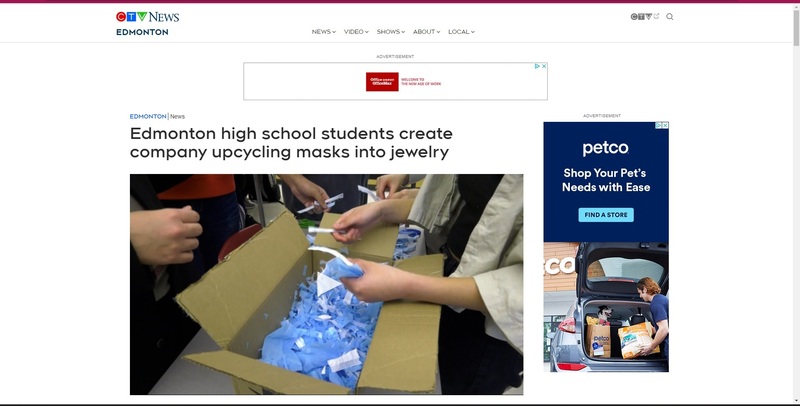 2022-05-06
2022-05-06Edmonton high school students create company upcycling masks into jewelry
This is a news story from CTV News by Adam Lachacz. A group of students from Lillian Osborne High School have formed a company to make use of disposable masks so that less of them end up in landfills. The company is called "Gaia" after the Greek goddess of the earth. The company is selling necklaces and earrings made from disposable masks online. -
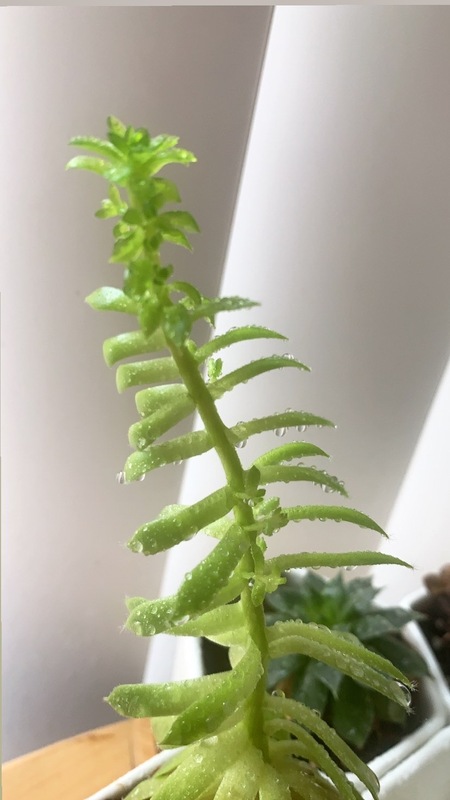 2020-03-18
2020-03-18All Things Will Pass
On this day, I recall watering my succulent and staring out the window with grave uncertainty of what was to come and utter confusion as to what exactly was happening. The stock market had just crashed andante pumped back up within minutes and the news was flooded with death and infection rates rising as people began clamoring for grocery stores to hoard supplies. The past two years living through COVID has felt somewhat like the process of the Calvin Cycle that kept my succulent in this photo nice and healthy. Although it is nearly impossible to articulate what life has been like or what was observed over the last two years, one great lesson I gained is the understanding that nothing is forever. It is all temporary. As I watered my plant with sheer emptiness and mentally checked-out due to the shock of the situation at the time, I began thinking about the Calvin Cycle process that my succulent or any plants outside would go through as my species was in dire panic. The world seemed to have stopped and sped up over night, but life itself remained to be what it was. Then the thought occurred to me. All things will pass. Living through COVID the last two years has seen work-from-home jobs rise to masses. I left one job to work at another and found that this was the worst comfort and behavior our species grew to become adapted to. For once, it has made us disconnected from reality and from each other. By being disconnected, it creates an issue of empathy and connection. The mantra of "connected while away," was shared everywhere when COVID first came about, but two years later, this has become the opposite. An example of this was observing many downplay the deaths of people from the virus, yet become very emotional once it was one of their family members. This could be viewed under a quick search on Google for the Reddit page of "Herman Cain Award." Bringing this page up primarily serves to show that both sides of the COVID discourse became contradictory as both sides were insensitive toward death. Was it due to being separated? I'll allow you to consider this. Another interesting point observed during COVID was the rise of irrational spending and mass speculation. Alan Greenspan once called the mass speculation a product of "Irrational Exuberance." The premise of this best serves that of investing as it describes the investor enthusiasm which drives asset prices higher than they are worth. However, the same could be viewed through the grocery hoarding of toilet paper or food where people became highly speculative of how long thee lockdowns would be. This was also indicative of the housing bubble 2.0 in which the Federal Reserve opened massive quantitative easing and opened cheap lines of credit for many. The result created more greed as people began hoarding one of the basic needs of our species in housing. How can a species feel righteous commoditizing shelter? The answer is irrational exuberance. Unfortunately, the result of the quantitative easing has created a massive issue where as the time I type this, the 1Q GDP results of the United States is at -1.4% and the inflation rate is at 8.5%. The Irrational Exuberance may be spelling the end of this decade's journey of cheap credit as it appears we are now headed for another Recession the next quarter. However, despite all of this irrational exuberance and the great stress these past two years have brought, I can no longer complain. I have adopted and accepted the Stoic philosophical belief that we must care for our neighbors as this will all pass. History has proven to be very biased when thinking in retrospect, but I hope my current peers use this to improve the future. ....... also, I never mentioned the protests, presidential change, food shortages in Sri Lanka and Peru, or how we have a dollar shortage crisis that nobody is talking about. All things will pass. -
2022-04-29
It's The Little Things
The pandemic was full of many things that turned the world upside down: the loss of jobs, death, and the decline in mental health for many students. I remember when the semester was transferred to fully online, many students like myself celebrated for the extended Spring Break and the ability to attend Zoom classes in pajamas. However, months passed and the daily lack of contact with acquaintances and friends, isolation, and lack of activities turned the days quite mundane quickly. The drastic change in an active lifestyle to such a slow paced one definitely had a negative impact on conditions such as depressive symptoms, health anxiety, and an overall learning curve of the lifestyle. Digging deeper, I know many families whose breadwinner of the family lost their job because many places were letting their staff go due to the lack of demand of labor. When dealing with a global pandemic, death was also a central topic to deal with. Many countries did not have access to medical equipment such as ventilators and thousands of people were dying in my motherland. I personally lost some family members and many people I know have as well. While the pandemic introduced our lives to a dark state, there was a slight silver lining, and that was spending time with the loved ones. Over the years before the pandemic, I feel like the world moved at an unbearably fast pace. My days consisted of going to class and work, possibly spending some time with friends, doing homework, and sleeping for the most part. As the world started to slow down because of the COVID pandemic, my father was finally able to work from home, my sister had online classes, and my mother didn’t have to rush to pick my sister up from school. Often, our meals during dinner would be inconsistent and spent near the TV as everyone had their own schedules. However, when the pandemic hit, it was advised to not eat at restaurants and take out fast food. Such restrictions led to trying out new recipes and laughing in the kitchen. Little moments such as conversations at the dinner table are still some of my favorite memories. In addition to cherished time with my family, I was able to finally rediscovered some hobbies that I used to enjoy years ago. Before the pandemic, my life had begun to revolve only around academics and I had forgotten what it felt like to spend the evening painting or trying out a new dance. However, spending months at a time at home forced me to redirect myself to other forms of entertainment when there was no use of travelling to other places. This really helped me define myself as someone who has so many other interests rather than just a student who studied 24/7. I still try to carry these hobbies into my schedule now that the world is slowly coming back to its fast pace. -
2020-03-13
Living through A Pandemic
I can clearly remember when the pandemic began and as it progressed. I was in my senior year of high school. Before we understood the magnitude of what was going on there was a general consensus that it would be over in a few weeks. There is a culture with the media that trends only last a short time and we move on as a society. We all thought this would be another trend. A few months later and many things were still shut down. I finished school online and got my diploma in my car. We wore masks everywhere to stop the spread and everyone kept hand sanitizer on them. I also worked in food service at the time which was considered an essential business. We got extra pay and had extra precautions to follow. A few steps that were put into place were timers to wash hands at least once every 30 minutes. When masks started to be required they were sold out. I made a makeshift mask out of hair ties and a bandana. Soon Covid-19 tests became widely available and that created individual quarantines. People would test every time they came in contact. In the beginning, people were worried about paying their bills. Both of my parents owned small businesses. We had to sell our home to scrape by. As time passed the country made accommodations to open businesses up again. Two years later and we are still majorly affected. Now we are affected by product and labor shortages. Often grocery stores are out of certain products. However many businesses created contactless services such as grocery pick up, and delivery became more widely common. -
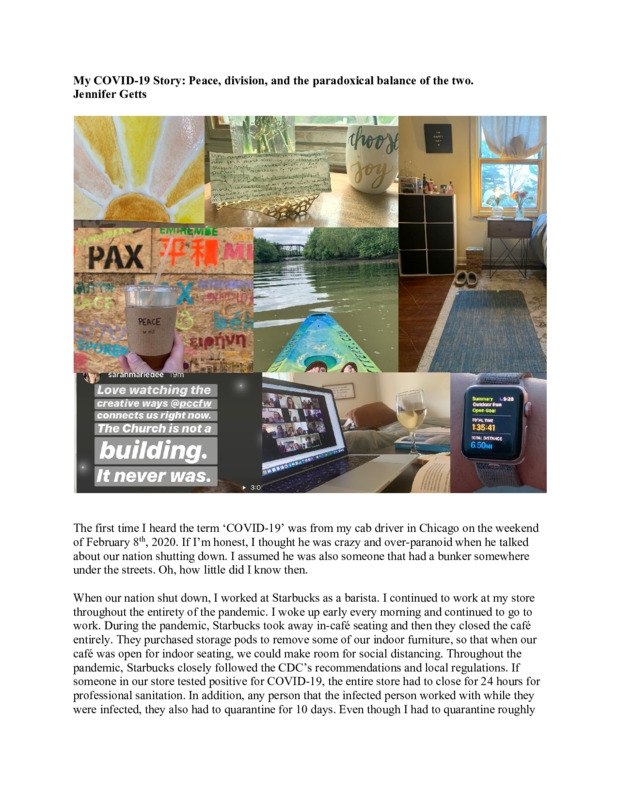 2022-04-29
2022-04-29My COVID-19 Story: Peace, division, and the paradoxical balance of the two.
The COVID-19 pandemic is largely associated with grief, pain, brokenness, division, and death. While that is true, it can also be associated with peace, quietness, solitude, growth, love, and birth. In my story, I try to strike the balance and prove that it is a paradoxical balance that can be weighed evenly. -
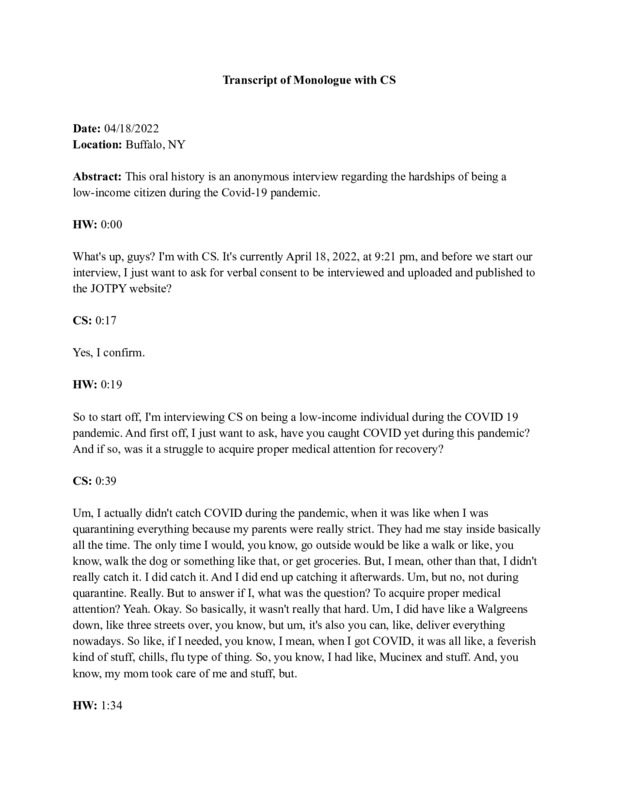 2022-04-18
2022-04-18CS Oral History, 2022/04/18
This oral history is an anonymous interview regarding the hardships of being a low-income citizen during the Covid-19 pandemic. -
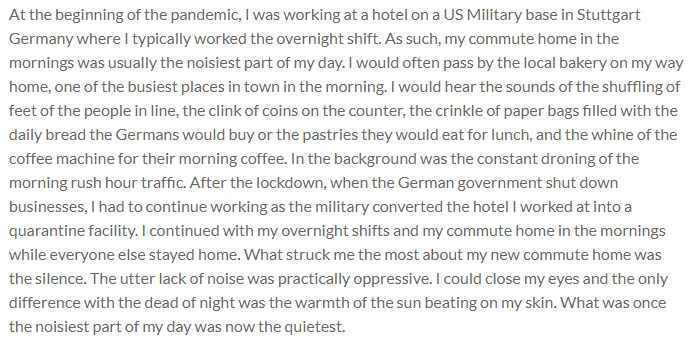 2020-05
2020-05Silence in the Morning
At the beginning of the pandemic, I was working at a hotel on a US Military base in Stuttgart Germany where I typically worked the overnight shift. As such, my commute home in the mornings was usually the noisiest part of my day. I would often pass by the local bakery on my way home, one of the busiest places in town in the morning. I would hear the sounds of the shuffling of feet of the people in line, the clink of coins on the counter, the crinkle of paper bags filled with the daily bread the Germans would buy or the pastries they would eat for lunch, and the whine of the coffee machine for their morning coffee. In the background was the constant droning of the morning rush hour traffic. After the lockdown, when the German government shut down businesses, I had to continue working as the military converted the hotel I worked at into a quarantine facility. I continued with my overnight shifts and my commute home in the mornings while everyone else stayed home. What struck me the most about my new commute home was the silence. The utter lack of noise was practically oppressive. I could close my eyes and the only difference with the dead of night was the warmth of the sun beating on my skin. What was once the noisiest part of my day was now the quietest. -
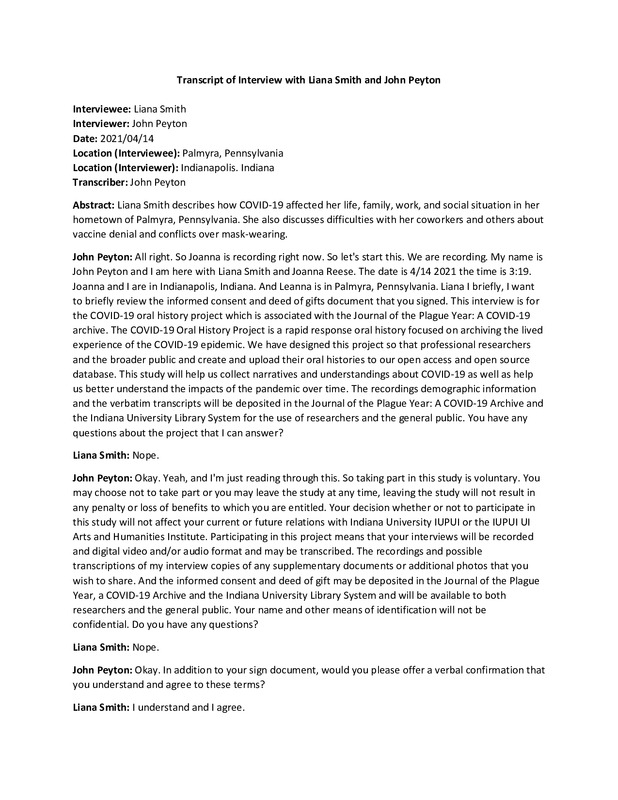 04/14/2021
04/14/2021Liana Smith Oral History, 2021/04/14
-
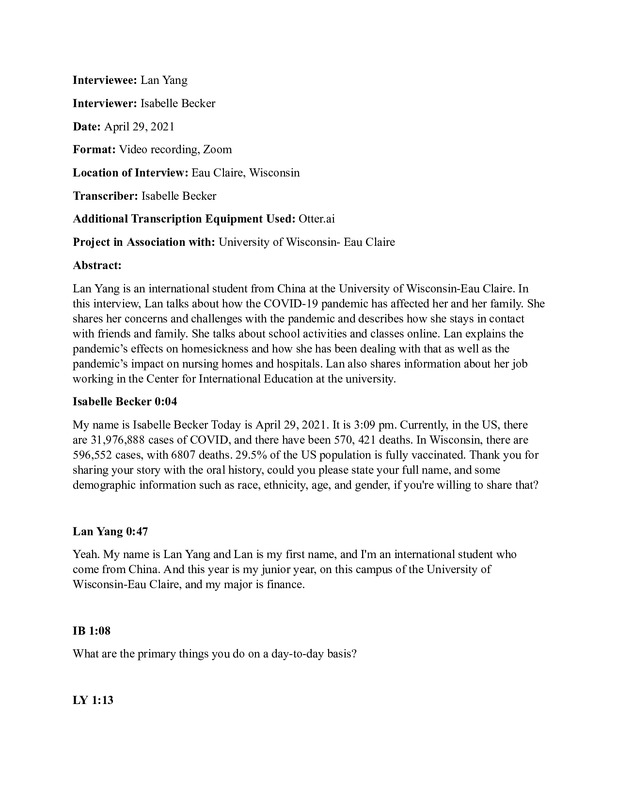 04/29/2021
04/29/2021Lan Yang Oral History, 2021/04/29
Lan Yang is an international student from China at the University of Wisconsin-Eau Claire. In this interview, Lan talks about how the COVID-19 pandemic has affected her and her family. She shares her concerns and challenges with the pandemic and describes how she stays in contact with friends and family. She talks about school activities and classes online. Lan explains the pandemic’s effects on homesickness and how she has been dealing with that as well as the pandemic’s impact on nursing homes and hospitals. Lan also shares information about her job working in the Center for International Education at the university. -
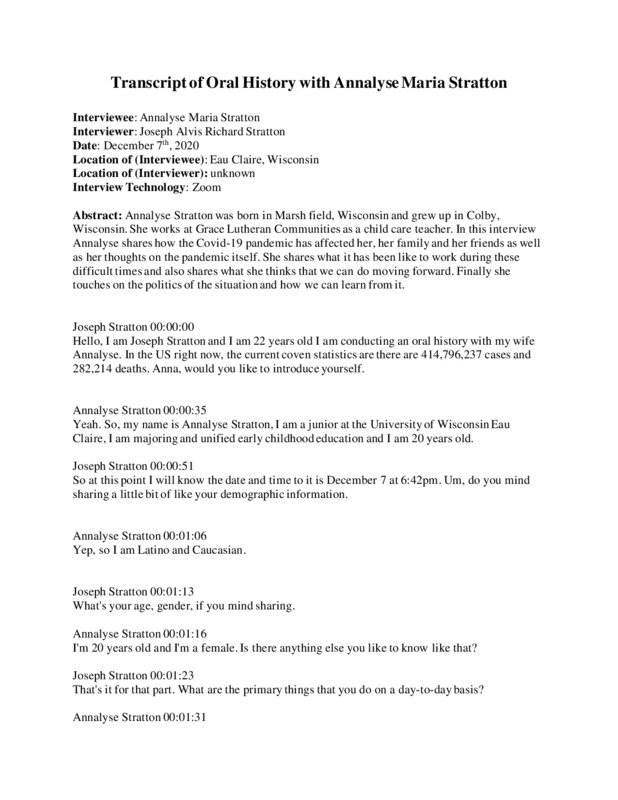 12/11/2020
12/11/2020Annalyse Stratton Oral History, 2020/12/11
Annalyse Stratton was born in Marsh field, Wisconsin and grew up in Colby, Wisconsin. She works at Grace Lutheran Communities as a child care teacher. In this interview Annalyse shares how the Covid-19 pandemic has affected her, her family and her friends as well as her thoughts on the pandemic itself. She shares what it has been like to work during these difficult times and also shares what she thinks that we can do moving forward. Finally she touches on the politics of the situation and how we can learn from it. -
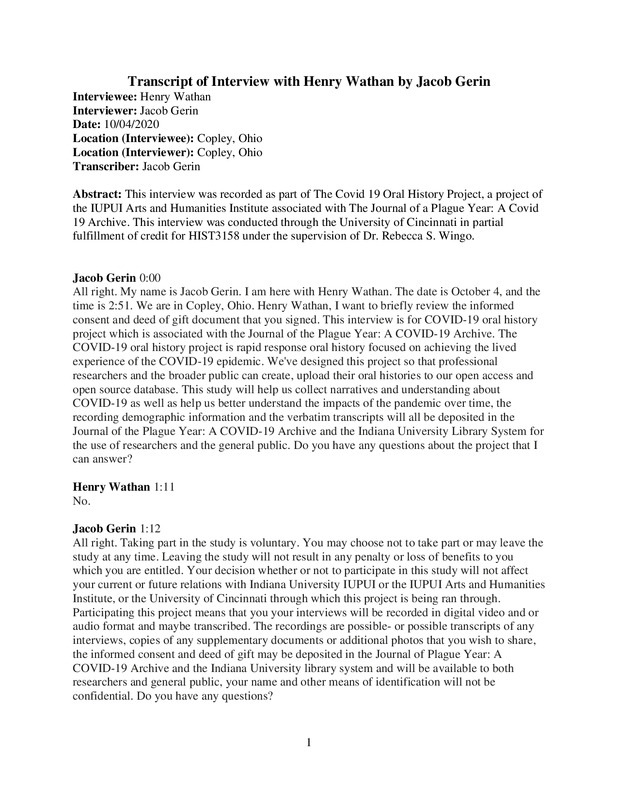 10/27/2020
10/27/2020Henry Wathan Oral History, 2020/10/27
This interview was recorded as part of The Covid 19 Oral History Project, a project of the IUPUI Arts and Humanities Institute associated with The Journal of a Plague Year: A Covid 19 Archive. This interview was conducted through the University of Cincinnati in partial fulfillment of credit for HIST3158 under the supervision of Dr. Rebecca S. Wingo.
